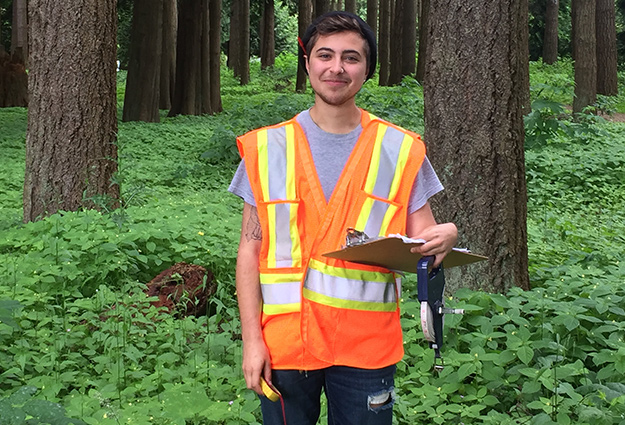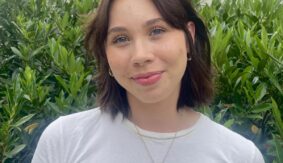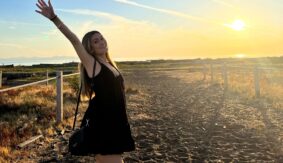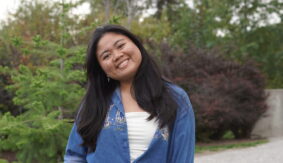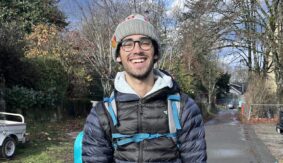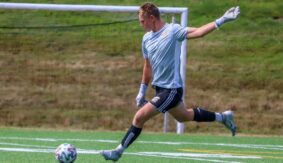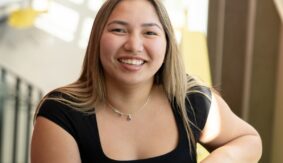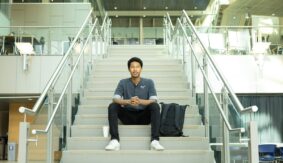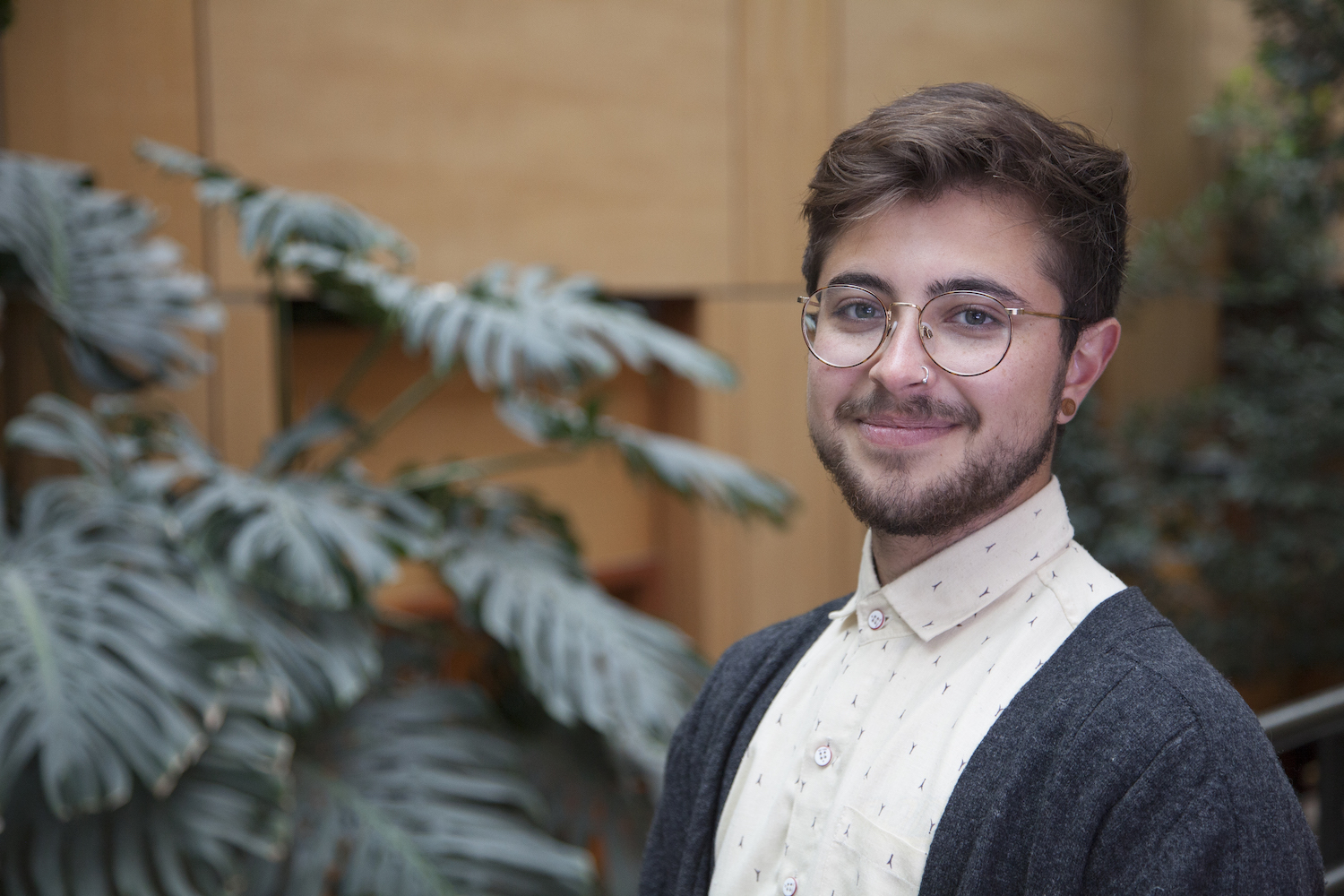
When you hear ‘forestry’ do you only think of trees? Third-year Urban Forestry student Elliot Bellis busts the stereotypes as he shares what his program is really like, and where his degree can take him
Third-year student Elliot Bellis was drawn to UBC’s internationally recognized Faculty of Forestry for its variety of programs, co-op options, and intimate size – but it wasn’t until his second year that he discovered his niche in Urban Forestry. “It was newly emerging,” he says. “Because of my apprehension, I started in the popular Natural Resources Conservation program.” But after making friends in Urban Forestry, he was swayed by their stories, plus the promise of exploring a different side of forestry.
Urban Forestry blends two of Elliot’s interests from childhood: urban planning and outdoorsmanship. “When I was a kid, I spent hours creating my own paper maps of cities I made up in my head, which is the first time I became interested in urban planning – even if I didn’t know what it was yet,” he says. Growing up in the densely forested Pacific Northwest, Elliot was able to nurture a passion for the outdoors through hiking and backpacking, alongside his burgeoning fascination with cities. “It took me along time to realize that I could combine those two interests and make a career out of it,” he says.
“The common vision between all the forestry programs is any work we are doing needs to be approached from a conservation standpoint.” – Elliot Bellis, 3rd year, Urban Forestry
Read on as Elliot talks more about his experience in UBC Forestry, busts the stereotypes – “forestry is not simply about harvesting trees anymore” – discusses the opportunities he’s taken advantage of, plus reveals how his career plans shifted from park ranger to urban planner.
In your experience, what is forestry really like?
Forestry, at first glance, is a lot of making fun of the stereotypical “lumberjack.” The historical flannel and beard combo is a remnant of what the faculty used to be. However, forestry is not simply about harvesting trees anymore. Sure, there are programs that specialize in forest management and operations, but the common vision between all the forestry programs is any work we are doing needs to be approached from a conservation standpoint. We learn how to manage for ecosystem resilience and mitigate the effects of climate change rather than simply “chopping down a tree.” I guess you could say we are “new-age lumberjacks.”
What do you think people would find surprising about studying forestry?
I think people might find it surprising that you won’t take many forestry-related classes until second year. They also might find it surprising just how many opportunities for research there are within the faculty. Finally, forestry is not just about the trees. You can study insects, fungi, wildlife ecology, hydrology, fire, and remote sensing within forestry as well.
What in particular surprised you?
I was surprised with how little forestry knowledge you acquire in first year. Instead you take courses focusing on English, geography, economics, and math to broaden your skillset. This was very helpful when it came to second year and third year, which are all program-related classes.
When you started your degree, what kind of career did you have in mind?
To be honest, when I first entered forestry, I had no clue what career I wanted – other than potentially being a park ranger. In the back of my mind, I had always wanted to be an urban planner, but I thought since I joined Forestry, I would have to shift my career goals.
Upon entering Urban Forestry, I realized I wanted to become a planner, whether that be urban planning, city planning, or park planning. After a co-op work term as a research assistant, I am intrigued with becoming a researcher as well to expand the knowledge base that urban forestry holds.
“The best part of Urban Forestry is the tight-knit community between the professors and the students. Having such a small program has enabled room for these connections that I don’t think you get in many programs.”
What kind of academic opportunities have you taken advantage of?
During the summer between my second and third years, I completed my first co-op term as a research assistant for Cecil Konijnendijk van den Bosch, the program director for Urban Forestry. This job helped me to network and make connections within the faculty and to become more confident with my own work. I conducted a research study on evaluating urban greenspace on UBC’s Vancouver campus, and helped develop a new tree inventory for campus utilizing remote-sensing technology.
This job has allowed me to continue these connections, for instance, by participating in the Urban Forestry Research Group. I also had the opportunity to attend, as a student scholar, a conference in Seattle on green infrastructure this year.
What’s the best part of the Urban Forestry program?
The best part of Urban Forestry is the tight-knit community between the professors and the students. Having such a small program has enabled room for these connections that I don’t think you get in many programs. I also really enjoy the opportunity for growth and development in the program currently. Since it is such a new program, having the chance to contribute by offering feedback makes Urban Forestry feel very inclusive.
What have the highlights of your degree been so far?
The highlights of my degree have been getting to develop and run my own research study, something I never thought I would get to do in my undergraduate work. Other highlights have been getting to present a group project for the City of Vancouver during CityStudio, and teaching a group of 30 transfer students how to value-map greenspaces.
How have extracurricular activities shaped your UBC experience?
Extracurricular activities have helped me to make many friends within and outside the faculty of forestry and have instilled a connection that I feel with the university. For instance, participating in the Thunderbird Marching Band for three years has allowed me to attend many sports games and meet new people. Also, being a Forestry Orientations and Transitions leader helped me to expand my leadership skills.
Do you have any plans or goals for the remainder of your degree?
One of my goals for the rest of my degree is to travel abroad during a co-op work term. Most of my studies and work have been very Vancouver-oriented, and I would love to take what I have learned and apply it to an international job.
